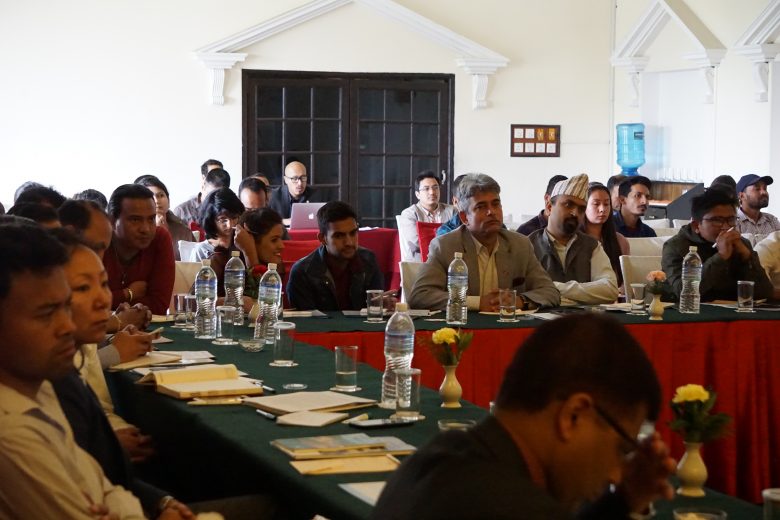On May 15, 2018 Samriddhi Foundation and Nepal Economic Forum jointly hosted an ‘Econ-ity’ discussion on the “Leveraging Federalism for Prosperity,” at Hotel Himalaya. Econ-ity is Samriddhi Foundation’s regular discussion platform for sharing perspectives from different sides on political economic agendas that are important in the contemporary context. The discussion focused on deliberating over the opportunities and challenges that have been laid down by the new Constitution, and also attempted to draw practical actionables for the government to facilitate smooth implementation of the Constitution.
Mr. Sujeev Shakya, Chair, Nepal Economic Forum moderated the discussion. Mr. Baikuntha Aryal, Head, National Natural Resource and Fiscal Commission (NNRFC), Mr. Rameshore Khanal, Former Secretary, Ministry of Finance and Mr. Niranjan Shrestha, Director, Laxmi Group were panelists in the event, and the audience featured senior intellectuals, economists, political analysts, politicians, members of the Civil Society Organisations, legal experts, and representatives of the private sector and labour group.

The event also saw the launch of Samriddhi Foundation’s most recent research ‘Leveraging Federalism: Doing Business and Economic growth for prosperity’ where different provisions regarding various regulatory sectors (Banks and Financial Institution, Labor Market and Business Corporations) and two of Nepal’s leading industries (Agriculture and Tourism) have been closely observed regarding competencies under various level of government as laid down in the Constitution. Within this scope, the research has also looked into various opportunities for growth as well as roadblocks that could potentially hinder progress. The report is designed to aid law-makers, intellectuals, students, universities and general population in making informed analysis of potential roadblocks in the implementation of federal system of governance.
The discussion also focused around the new economic challenge in front of the new federal setup—prosperity. This prosperity in tangible terms is seen in government plans of graduating from a Low Developed Country (LDC) by 2022 and achieving Middle Income status by 2030. Currently, Nepal stands for graduation due to efforts of Nepali citizens as shown by Human Asset Index and Economic Vulnerability Index and performs abysmally on the Gross National Income components. Its GNI is lowest in the SAARC region and has additional challenges of being a Landlocked country. Thus, Nepal requires robust improvement in Doing Business in Nepal (in which it ranks 105).

Some ideas shared by the speakers are as follows:
Rameshore Khanal
- Local government has been empowered to a large extent in the federal structure. Therefore, we can expect development activities to get decentralized.
- It is still unclear as to which level of government is responsible for business registration and licensing. It would be better if it is delegated to the local government. But, confusion regarding operation of a business registered with one municipality, outside of that municipality may arise. Laws should be made to clear this confusion.
- Co-operatives comprises a major part of the entire financial sector in Nepal. Unregulated co-operatives could be a risk to financial system. Mechanism should be devised to regulate co-operatives.
- Nepal faces a problem of lack of availability of skilled labour force. State government should focus on developing skilled labour force. It should invest in development of those skills which it feels are of utmost importance in that state.
- We cannot expect federalism to deliver results immediately. We will be creating mistakes in first few years. We should learn from the mistakes to create a better system and institutions, and if we do so, we will certainly move towards prosperity.
- One of the major problems that is regularly discussed is that local government does not possess enough resources to carry out its activities. But, lack of resources at its disposal is not a major problem. It should be focused on effective mobilization of private and community resources. Direct spending of the local government cannot bring economic growth, but private and community resources are more important. Local government should focus on devising policies which would facilitate effective and efficient utilisation of private and community resources.
Baikuntha Aryal
- Most of the people are of the opinion that federalism will have instant effect on economic growth and development. Many people complain that local government has not been able to deliver results. These expectations of the people are not justified. It took years for many countries to see the impact of federalism on economic growth and prosperity. We have just started to implement federalism. We are in the process of making laws for its implementation. Hence, in the first few years, we might not observe positive effects of federalism in our lives, but eventually federalism will most certainly deliver.
- Many people are of the concern that federalism will be costly and it will cause an increase in government expenditure. To a certain degree it true, but proper management of federal structure also brings added benefits, which can easily overcome the costs.
- In agricultural sector, primary focus has been given to production. We have not given any priority to marketing and storage of agricultural product. Lower tiers of government should place importance to these as well.
- In the case of labour market regulation, state government should be authorized to give licenses to medical personnel, lawyers, engineers and other professionals. In this way, states themselves can prioritise the human resources that they want to build and act accordingly.
- Co-operative sector covers a major portion of financial market in Nepal. Problems in this sector could bring crisis in the financial sector. Hence, they should be regulated. It should be clearly defined which level of government is to regulate co-operatives.
Niranjan Shrestha
- Implementation of federalism will incur additional costs; the government expenditure is bound to rise. Private sector is quite worried that this added burden of cost will be transferred to them. In unitary system of government, the regulators were centralized, therefore the businesses were also attracted to the centre. Industrialists operating their plant in other cities like Biratnagar and Burgunj had their offices in Kathmandu as well. But, in the federal structure, the regulatory agencies are expected to get devolved. Services like business registration and getting licenses and permits are expected to be delivered from state and local level. Devolution and decentralisation of regulatory bodies would also lead to decentrsalisation of businesses, thus creating equal opportunities in every part of the country.
- Contract farming could revolutinise agriculture sector. Agricultural productivity can be increased through contract farming. Local level can handle matters related to contract farming.
- Nepal tourism board should be devolved. The central board should only be focused on marketing Nepal as a touristic destination in international arena. Domestic tourism promotion can be done by state boards.
- Labour Act and Banks and Financial Institutions Act has not been made following the spirit of federalism.
The program ended with a lively interaction with the members of the audience. There was a general consensus that lack of clear-cut demarcation of powers of different units of the government and a clear policy framework even after the formation of all units of government are some of the major impediments to smooth implementation of the Constitution.
Below are some of the links to news coverages of the Econ-ity on Leveraging Federalism for Prosperity
बैंकिङ प्रणालीले गरिबलाई अझै गरिब बनाउन प्रोत्साहन गर्यो : पूर्व अर्थसचिव खनाल
Study highlights need for clarity in regulatory provisions
समृद्धिका लागि संघियताको लाभदायी उपयोग
बजेटमा युवा लक्षित कार्यक्रम राख्न सुझाव
संघीयता खर्चीलो भए पनि धान्न सकिंछ

